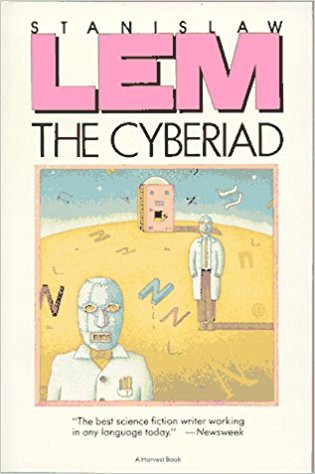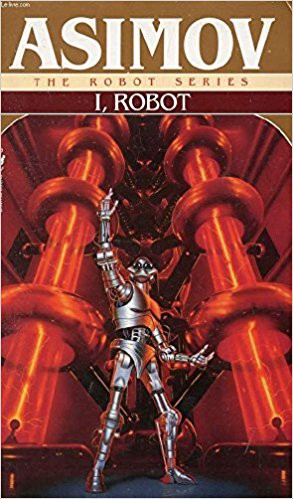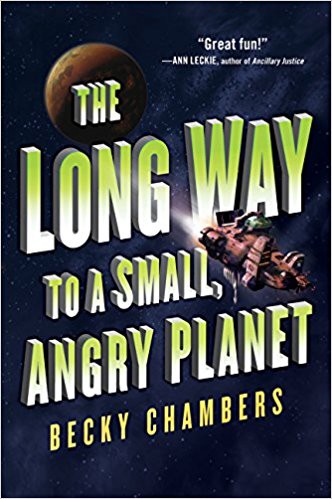Reading Lists
8 Books About Our New Robot Overlords
Fictional visions of androids, AIs, and other ways humans make technology in our own image

Remember the 1999 Disney Channel Original Movie Smart House? Shortly after his mother dies, Tech wiz kid Ben wins a brand new home with an in-house digital assistant system named PAT. Ben programs PAT to become a surrogate mother to keep his dad from needing to date anyone, until (spoiler alert) PAT takes on a tyrannical parenting philosophy that no one cares for.
Nearly twenty years later, we don’t have PAT, but we do have Alexa, and Siri, and Cortana. Just last week, The New York Times reported that Amazon’s Alexa has been laughing out-of-turn and without permission in conversations she’s not even a part of. Creepy. Is Alexa laughing at us or with us? While we aren’t asking these digital assistants to be our mothers (yet), we do ask them to wake us up, take care of our calendars, sing us lullabies, tell us the meaning of life. So is technology creepy or are we — the creators of technology — the real creeps?
Is Alexa laughing at us or with us? Is technology creepy or are we — the creators of technology — the real creeps?
There’s a lot to unpack here. Like, what’s the deal with naming all these “assistants” after women? And what exactly do we hope these anthropomorphized bots can do for us? While we can’t answer every one of these questions, here are 8 stories about robots — and we’re using the term “robot” pretty broadly here to include robots, artificial intelligence devices, and even one sex doll — that conjure up a history of our hopes and dreams, failures and successes with technology personified.

“Nirvana” by Adam Johnson from Fortune Smiles
In the near future, beds are voice-activated and drones inconspicuously hop from place to place. The president has been assassinated, and our protagonist is a programmer who has developed an algorithm that takes the archived recordings of the president to make him come to life again as a video-projection/hologram. His wife, Charlotte, has Guillain-Barré syndrome, an autoimmune disease that has left her paralyzed and potentially suicidal. The protagonist copes by talking to the virtual president every night, while Charlotte listens to Nirvana. It’s a heartbreaking, pretty perfectly executed story. What are the parts of life we get to do over?

The Cyberiad by Stanislaw Lem
Originally published in Poland in 1965, The Cyberiad was translated into English in 1974. It’s a collection of hilarious short stories that follow Trurl and Klapaucius, the brilliant “constructors” so named because they can seemingly construct whatever they want—and who are themselves from a race of robots who, the reader eventually learns, evolved to replace humans. The constructors can move around the stars to build advertisements, but also help those in need (for a fee, of course). In this medieval-space universe there are princesses and knights, sword fights and spaceships. Death is a problem that can be fixed, and loads of robots fall in love. The short story collection is a commentary on our endless desire for technology to fix the human condition, even if that means replacing it, and the comical failures on the other side of that desire.

I, Robot by Isaac Asimov
This a seminal collection of stories is framed by Dr. Susan Calvin who tells each story in the collection to a reporter in the 21st century. (Futuristic!) The collection includes Asimov’s “Three Laws of Robotics,” which would influence his later science fiction and even the “real-world” thinking about the ethics of artificial intelligence. Asimov was interested in troubling the “technophobia” around robots by writing stories about robots that help out humanity rather than war against it. In “Robbie,” he turns the old “the puppy went off to live on a farm” story on its head when a little girl can’t shake the loss of her best friend/robot named Robbie. In “Liar,” a robot named Herbie learns that lying to avoid hurting someone is never the right answer. And in “Evidence,” Stephen Byerley is gravely injured in an accident, but survives and becomes district attorney. His opponent creates a smear campaign claiming he’s actually a humanoid robot because no one ever sees him eat, and he has never prosecuted an innocent man. Is he simply “a really good man” or an unconvincing robot? In order to prove he’s of the flesh, he has to violate one of the three laws of robots by harming a human.

Do Androids Dream of Electric Sheep? by Philip K. Dick
We had to have some morally complicated robots on the list. Do Androids Dream of Electric Sheep? (1968) is the novel that loosely set the stage for the 1982 film Blade Runner. It’s set in the year 2021, when most of the world has been destroyed by nuclear war, including most animal species. Humans are being carted off the planet with the promise of personal human-like androids waiting for them on Mars, and the humans that stay behind purchase incredibly lifelike android animals. Convinced that the all-too-lifelike androids on Mars will revolt and take over, the government bans them, employing bounty hunters like our protagonist Rick Deckard to find and “retire” the rogue androids who have escaped and gone into hiding. As with a lot of books on this list, Dick asks us to think about what it means to be human, who (and what) deserves empathy, and who gets to have an identity.
My Year in Re-Reading After 40: Do Androids Dream of Electric Sheep

Ancillary Justice by Ann Leckie
When I started compiling this list of robot stories, I ran into a problem: most of the obvious choices were written by men. Even more disturbing, a lot of the stories were about agency-devoid women femme bots, or real live women being manipulated by technology mastered by men. Praise be for Ancillary Justice, the revenge-quest space opera, which beat out Nail Gaiman for the prestigious Nebula Award for best novel in 2013. Breq, our protagonist, was once a starship that used artificial intelligence to link thousands of corpse bodies living through one central consciousness used by the Radchaai empire to conquer the galaxy. But after an act of treachery leaves Breq separated from the central consciousness, she’s on a quest to revenge herself and kill the Lord of the Radch before anyone realizes what’s happened. It’s a complex story , moving across millennia and back and forth between different perspectives. For all you language lovers out there: Breq’s home language, which doesn’t distinguish between genders, and defaults to “she” until she learns otherwise, creates the effect, as Gretchen McCulloch wrote for Slate, “that the gender of the male characters is paradoxically less important and more visible,” and that the universe by default is understood to be dominated by women. And did I mention it’s part of a trilogy?

The Alchemy of Stone by Ekaterina Sedia
Mattie is an automaton stuck in the middle of the ongoing war between the Alchemists and the Mechanics in the city of Ayona. The alchemists, those who can manipulate stone but eventually turn into stone themselves, are the older order. The mechanics are the “innovators,” whose inventions are drastically demolishing the old to build up the new. After being seemingly emancipated by her mechanic master to study the alchemists, Mattie discovers more than she’s meant to. And the mechanic leader who built her still holds the key that literally winds up her heart up to keep her “alive.” The stakes are raised when a series of attacks exposes Mattie to the corruption keeping the city fueled and fed. It’s a melancholic and fantastical rendering of real-world gender, race, and class inequalities.

The Long Way to a Small, Angry Planet by Becky Chambers
Rosemary Harper has given up the last of her nest egg on the Mars black market to become someone else — new name, new job, new destination— onboard the “Wayfarer,” with a fitting cast of characters onboard. There’s creepy and commanding Corbin; Sissix a scaly, feather-haired Aandrisk; the navigator Ohan; Kizzy and Jenks the techs; Dr. Chef the cook; Ashby the captain; and Lovelace (or “Lovey”) the AI. Their day-to-day jobs involve punching wormholes in between systems for other ships to travel through until they’re given the opportunity to take on a new job that promises loads of money and of course, loads of crazy risks. Lovey (named after Ada Lovelace the mathematician and first computer programmer), a sentient AI with no physical body, and the tech Jenks are in love. What I love about this story is the way it warps the “femmebot” trope of a female AI constructed for mindless sexual gratification. Instead of being a gleaming hunk of metal with some semblance of sentience, Lovey at one point considers getting a body kit so she can be with Jenks in physical form, but is worried about how this physical body will dull her sensibilities.

Made for Love by Alissa Nutting
Though it’s not exclusively about robots or artificial intelligence, Made for Love is on this list because it is a book that deals with the very real (and often grotesquely hilarious) reality of looking for physical pleasure and genuine connection when technology promises to provide these things more consistently than humans can. After deciding to leave her controlling tech husband, Byron Gogol, our protagonist Hazel shows up at her father’s trailer looking for a little escape, only to find out her dad’s shacked up with a sex doll named Diane. Hazel’s looking for a life change after Byron asks (read: demands) that she have a chip put in her head so they can “share” memories, like a file-sharing incarnate situation. In alternating chapters, we meet Jasper, the con man literally screwing women out of their wealth who, after a strange accident, has been left only attracted to dolphins. Everyone’s interested in sharing more, but touching each other less. When what we crave (i.e. human connection) is unpredictable, gross, and at times scary, we’ll try any substitute to avoid the pain, and create a whole different mess in the process. Hazel’s life is a different kind of wreck, one that we want in on rather than one we can judge with a sick kind of pleasure from afar. As Jia Tolentino writes in her review for The New Yorker: “She is the rare literary heroine in whose company it would be a pleasure to absolutely wreck my life.” Amen to that.








